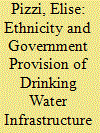| Srl | Item |
| 1 |
ID:
187271


|
|
|
|
|
| Summary/Abstract |
Why do migrants choose some destinations over others? This study explores government language policy and the role of language differences in migration decisions. While governments can use language policy to reduce communication barriers, vernaculars remain critical in terms of regional communication and identity recognition. Using a survey experiment and econometric analyses of nationally representative data from China, the authors examine the communication and cultural roles of language in migration decisions in the context of a unifying common national language. The empirical tests find that migrants prefer destinations where local vernacular languages are more similar to their own, despite a common national language. Once migrants have moved, a common national language helps migrants communicate and therefore remain in their migration destinations, but it does not eliminate the role of the local vernacular as a cultural marker. The result is that both the common language and local vernacular matter for domestic migration, even in a country where the government has promoted a single common language for six decades. The findings have far-reaching implications for migration policy and citizenship management in general.
|
|
|
|
|
|
|
|
|
|
|
|
|
|
|
|
| 2 |
ID:
173177


|
|
|
|
|
| Summary/Abstract |
What areas of the country does the Chinese government prioritize for drinking water provision infrastructure? Chinese policy prioritizes ethnic minorities and minority autonomous areas due to concerns about inequality and interethnic harmony. However, the implementation is not always equitable or favorable for ethnic minorities. Drawing on a new data set of more than 10,000 drinking water projects, I explore how ethnicity and autonomy influence public goods provision in rural Guizhou Province. I find implementation concerns trump official policy priorities when it comes to drinking water infrastructure. Such facilities are more likely to be built in Han-majority areas, because implementation and project completion are easier for officials. The findings have implications for ethnic politics and public goods provision in nondemocratic contexts. They also demonstrate why regions with larger minority populations are often slower to develop and slower to receive better access to basic public services.
|
|
|
|
|
|
|
|
|
|
|
|
|
|
|
|
| 3 |
ID:
131760


|
|
|
|
|
| Publication |
2014.
|
| Summary/Abstract |
How do rebel groups determine their targets during intrastate conflict? We build upon two competing theories in conflict studies that emphasize either the social or economic determinants of violence during war and use geographic information systems (GIS) analysis to explore these competing theories. To do this, we utilize a subnational analysis of the most likely case of the Democratic Republic of the Congo to understand whether ethnicity or natural resources motivates the location of conflict events. Accounting for geography, we find that economic endowments in the form of natural resources are highly related with the number of violent attacks, while the presence of competing ethnic groups does not offer much help in understanding the location of conflict events.
|
|
|
|
|
|
|
|
|
|
|
|
|
|
|
|
| 4 |
ID:
182861


|
|
|
|
|
| Summary/Abstract |
How does ethnic identity affect political participation in China? The Chinese government gathers information and shapes public opinion through mass mobilization. These efforts include the managed mobilization of politically sensitive ethnic minorities. We draw on a dataset of the preferred political activities among 8,000 individuals in China, including more than 1,500 ethnic minority group members and find that politically sensitive minority groups rarely stay silent when faced with problems. Instead, they are more likely than the majority Han to participate and express grievances. However, ethnic minorities overwhelmingly prefer political participation by directly contacting the government, that is, through institutionalized and carefully managed channels. We show that populist authoritarian governments encourage political action by ethnic minorities through institutionalized channels while penalizing confrontational activities. As these minorities are integrated into Chinese society, measured by language proficiency, they tend to become politically more sophisticated in using nontraditional channels such as the internet and confrontation for problem solving.
|
|
|
|
|
|
|
|
|
|
|
|
|
|
|
|
| 5 |
ID:
188072


|
|
|
|
|
| Summary/Abstract |
What explains the specific location of Islamic State attacks in Syria and Iraq? We consider how both ethnic and economic factors shape the group’s decision-making about where to attack. We explore these competing motivations using spatial analysis of the Islamic State’s individual acts of violence from 2013–2017. We find that both areas with ethnic heterogeneity and valuable economic rents are associated with more individual Islamic State violent events. By examing the micro-foundations of the Islamic State’s conflict decisions, we provide further nuance to understanding the strategic logic of rebel groups during wartime.
|
|
|
|
|
|
|
|
|
|
|
|
|
|
|
|